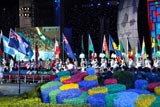How to win international sport galas
Updated: 2011-08-12 15:23
By Shi Yingying (China Daily)
SHENZHEN — One of the most frequently asked questions to organizations such as the International University Sports Federation (FISU) and the International Olympic Committee (IOC) is what qualifies a city to throw large-scale sports events.
Claude-Louis Gallien, the new president of FISU, provides the answer and it has little to do with money or facilities.
"I would say one of the + rest things is probably not only the financial resources, but also the human resources," Gallien said.
"We get to see whether people are serious about it (sports). "People can be happy to say they can do things, but then are not really able," he said. "We try to see who are the people in front of us and how serious they are.
For example, when I came to Shenzhen, I could see the students here were really interested in having this Universiade." Despite its roots in Europe, FISU is now expanding more quickly than ever before, especially in this region.
"Asia is becoming more and more important for us and it is willing to do as much as possible. So there is no reason that Asian countries can't hold more Universiades."
However, as a student organization, FISU needs financial support before throwing the event to other cities. Therefore, money counts as well.
"Three of the bidding cities for the 2017 Summer Universiade are Brazil's Brasilia, Turkey's Koceali and Taipei. We will see whether the Brazilians have lots of money, the Turkish have a strong economy or Taipei's citizens are rich," Gallien said.
Facing the argument that it may not be an even field given that some African countries are at a disadvantage economically, Gallien suggested a new solution.
"I do hope we will be able to hold it in Africa, but it's not just the question of money, it's also a matter of logistics and many other details," he said. "The event could be organized in one region, one zone or even one country in Africa, rather than in an African city."
Another idea Gallien has for the future of the Universiade is to set competitions between different universities instead of countries. "Sports competitions between nations will probably decrease interest, and I see the merging (of competition) between universities.
Because universities are getting more and more powerful, they have the money, but they need identity. Sport gives identity," he said. Claude-Louis Gallien is all smiles after being elected to his new role as the next FISU president.
Video

Working as a Universiade volunteer

Party starts as Universiade ends

Sumptuous seafood in Shenzhen

Athletes test doping knowledge
About Shenzhen

